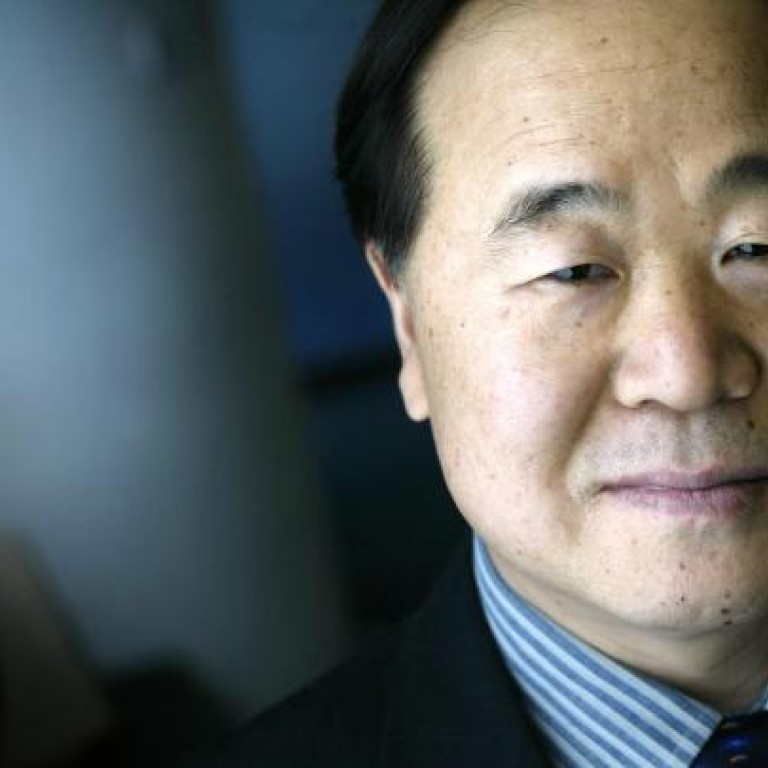
Media frenzy over author Mo Yan's chance to win Nobel Prize
Acclaimed author Mo Yan is being touted as possible first Chinese national to win honour, despite his cosy links to Communist Party
Critically acclaimed for his work and faulted for his tolerance of government censors, Chinese author Mo Yan has suddenly found himself at the centre of a media frenzy over his prospects of winning the Nobel Prize.
The mainland media has gone into overdrive touting the possibility that Mo could become the first Chinese national to win the prestigious literature award after odd-makers picked him as a leading candidate tomorrow.
The online betting site Ladbroke's put the odds of Mo Yan's winning at 8-1, just behind Japanese novelist Haruki Murakami, and Irish author and playwright William Trevor.
But rather than bask in the limelight, the 57-year-old author has spent recent days dodging questions for fear of being accused of courting the West. "Once I talked about it, I would be attacked, as many have been criticising Chinese writers for the Nobel Prize anxiety," Mo Yan was once quoted as saying.
Born as Guan Moye to a rural family in Gaomi , Shandong province, Mo Yan began writing while in the army in 1981 and adopted his pen name, meaning "don't speak". He rose to international fame with his in 1987, which was made into a film of the same name by director Zhang Yimou.
Mo Yan has made no secret of the influence that previous Nobel Prize winners, such as William Faulkner and Gabriel Garcia Marquez, have had on his magical realism and the complex narratives he weaves about rural life and family feuds.
Only one Chinese writer has won the Nobel Prize, Gao Xingjian. Gao was born in China but was a French national when honoured in 2000.
Chinese dissident Liu Xiaobo won the peace prize in 2010.
Drawing largely upon his upbringing in Gaomi, Mo Yan has written dozens of short stories and novels, including , which was awarded the Newman Prize for Chinese Literature in 2009, and , which received the prestigious Mao Dun Literature Prize last year.
Mo Yan was once so prolific that he was said to have written , a vivid, 500,000-word epic spanning five decades of the country's economic transformation, in just 43 days.
But his ability to thrive under a strict censorship regime, which has led to the muzzling or imprisonment of some of his peers, has exposed him to intense criticism. Some supporters worry that could undercut his candidacy for the Nobel Prize.
Unlike others, Mo Yan has chosen to co-operate with authorities, something underscored by the government's sponsorship of a symposium in his hometown dedicated to his novel last September.
A vice-chairman of the controversial, government-backed Chinese Writers' Association, Mo Yan withdrew from the Frankfurt Book Fair in 2009 to protest against the attendance of Chinese dissident writers including Dai Qing and Bei Ling.
He came under fire again in June for joining 100 mainland writers and artists who commemorated Mao Zedong's "1942 Yanan Talks" - a set of doctrines that shaped literature under early Communist Party rule - by hand-copying the transcript.
Mo Yan's attitude towards living as a writer on the mainland may be compared to the outlook of a character called the Fourth Aunt from his novel . "Whatever it is, don't let it get you down," she says. "Try to see things as they are. The world isn't made for people like us. We must accept our fate."
David Der-wei Wang, a professor of Chinese literature at Harvard University, said Mo Yan's decisions about censorship should not damage his status as a world-class writer.
"Mo Yan is an honest writer, while he knows how to survive the coercive censorship in the PRC," Wang said. He noted Mo Yan's 1992 , which depicts an absurd, gluttonous and promiscuous dystopia and offers a prophecy for the inception of a post-socialism China after Mao and Deng Xiaoping .
"The quality of his oeuvre to date is outstanding," Wang said.
Many of Mo Yan's works have been translated into English, mostly by his dedicated translator, Howard Goldblatt.
Luan Meijian, a Fudan University professor who two years ago predicted a Nobel for Mo Yan, said his increased international exposure had set the stage for his recognition.
